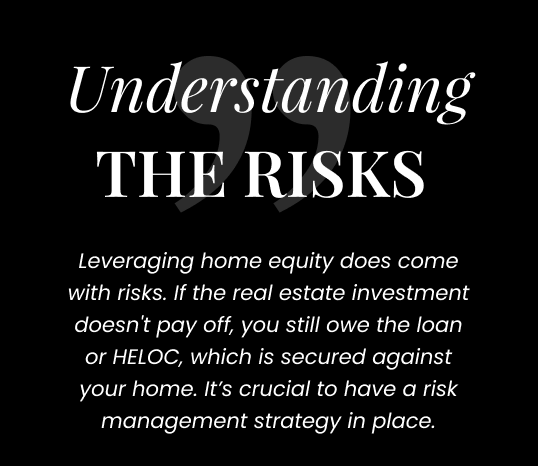
The world of real estate investment is often perceived as the realm of high-net-worth individuals or seasoned investors.
However, homeowners have a unique and often underutilized tool at their disposal – home equity. This article delves into how you can use the equity in your home as a springboard into real estate investing, opening doors to potential wealth growth and financial stability.
Home equity is the difference between the current market value of your home and the amount you owe on your mortgage. As you pay down your mortgage and as your property appreciates in value, your equity increases. This equity can be converted into liquid cash through various methods like a home equity loan or a home equity line of credit (HELOC), providing a source of funds for investment.
Chances are, if you bought your home more than a couple of years ago, you are sitting on a fair amount of equity as real estate values have increased exponentially over the last 10 years.

The first step is to determine how much equity you have in your home. This can be done by getting a professional appraisal from a local agent, or comparing your home with similar properties in your neighborhood.

Now that you know how much equity is in your home, it is time to figure out which financing option is best for your circumstances.
Home Equity Loan: This is a lump sum loan with a fixed interest rate, repayable over a set term. It’s suitable for investors who have a specific property in mind and need a fixed amount of money.
Home Equity Line of Credit (HELOC): A HELOC works like a credit card, giving you access to a line of credit that you can draw from as needed. It’s ideal for investors who may require funds at different stages, such as for renovations or multiple property purchases.
You need to figure out where you want to invest and also what type of investor you want to be. People invest in different types of real estate, using different investing strategies and timeframes.
The two most common types of residential real estate investments are single-family rental homes and small multifamily properties.

Real estate investing timeframes can be short term or long term, depending on the level of risk an investor is comfortable with.

Short-term real estate investors include people who wholesale or fix and flip homes in the hope of making a quick profit.

Buy-and-hold real estate investors purchase property for the long term, with the goal of making money through rental income, property appreciation, and tax benefits.
An agent will not only help you do thorough research on the local real estate market they will identify properties in areas with high rental demand, potential for appreciation, or opportunities for value-add through improvements. Make sure to seek out an agent who has a thorough understanding of the local market and investment strategies.
Assess the potential rental income, ongoing maintenance costs, property taxes, and other expenses to ensure positive cash flow. It’s important to ensure that the investment can cover its expenses, including the repayment of the equity loan or HELOC.
Consulting with real estate experts, financial advisors, and tax professionals can provide valuable insights and help you make informed decisions.


Build Wealth: Real estate can appreciate over time, providing long-term wealth growth.

It generates a steady stream of income, which can be reinvested or used to cover the loan used to finance the purchase.

Investing in real estate adds diversity to your investment portfolio, reducing risk.
Using home equity to break into real estate investing is a strategic move that can lead to substantial financial rewards. However, it's not without its risks and requires careful planning, market knowledge, and professional advice. With the right approach, homeowners can turn their equity into a powerful tool for building wealth through real estate investment. Remember, the key to success in real estate investing is not just in the acquisition of properties, but in the prudent management of your investments and finances.

Let's set up a conversation to strategize and talk about the best opportunities in the area.

Let's set up a conversation to strategize and talk about the best opportunities in the area.